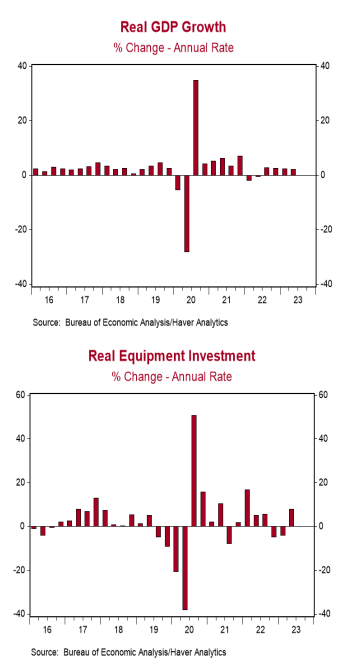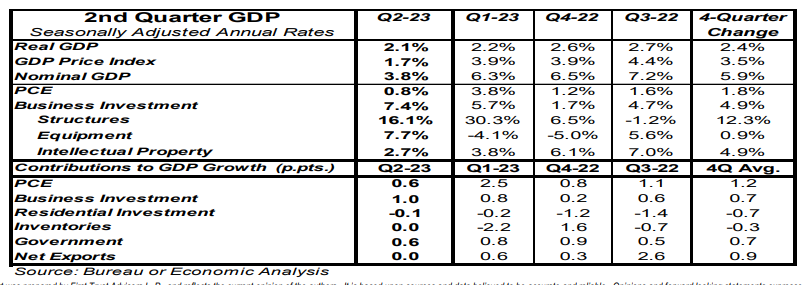- Real GDP growth in Q2 was unrevised at a 2.1% annual rate, coming in slightly below the consensus expected 2.2%.
- Downward revisions to consumer spending offset upward revisions to business investment, residential investment, net exports, and inventories.
- The largest positive contributions to the real GDP growth rate in Q2 were business investment, consumer spending, and government purchases. The weakest component was residential investment.
- The GDP price index was revised lower to a 1.7% annual growth rate from a previous reading of 2.0%. Nominal GDP growth – real GDP plus inflation – was revised lower to a 3.8% annualized rate from a prior estimate of 4.1%.
Implications:
The final reading for real GDP growth in the second quarter ended up matching last month’s reading, but the “mix” of growth changed. A large downward revision to consumer spending, mainly in services, offset upward revisions to commercial construction, net exports, inventories, and home building. Today we also received comprehensive revisions to GDP and related data going back many years in some cases. Current-dollar measures of nominal GDP and related components were revised from the first quarter of 2013 through the first quarter of 2023. Gross Domestic Income (GDI) and selected income components were revised going back to 1979. All in all, the updated estimates show that real GDP increased at an average annual rate of 2.2 percent from 2017 to 2022, only 0.1 percentage point more than the previously estimated. We also got our second look at economy-wide corporate profits for Q2, which were revised higher, now up 0.2% from Q1, but still down 2.7% from a year ago. The government includes Federal Reserve profits in these data, and the Fed is generating unprecedented losses. So, we follow profits excluding those earned (or lost) by the Fed, which are still up 6.2% from a year ago. Looking at the benchmark revisions to prior years, profits are now 13% higher than originally estimated, great news! But even with new higher profits our Capitalized Profits model still shows the market is overvalued. We would need to see the 10-year Treasury yield at around 3.5% to be fairly valued today. Moving forward, we expect declines, or small gains in corporate profits as the economy continues to re-normalize after the massive fiscal and monetary stimulus of 2020-21. In turn, this will be a headwind for equities. In addition to corporate profits, we also got a second look at the Q2 total for Real Gross Domestic Income, an alternative to GDP that is just as accurate. Real GDI was revised higher, rising at a 0.7% annual rate in Q2 but is up only 0.2% versus a year ago, consistent with underlying economic weakness. These are figures that are normally seen in and around recessions. Regarding monetary policy, the inflation outlook has improved. GDP inflation was revised lower to a 1.7% annual rate in Q2 versus a prior estimate of 2.0%. However, GDP prices are up 3.5% from a year ago, still well above the Fed’s 2.0% target. Meanwhile, nominal GDP (real GDP growth plus inflation) rose at a 3.8% annual rate in Q2 and is up 5.9% from a year ago. In employment news this morning, initial claims for jobless benefits rose 2,000 last week to 204,000. Continuing claims rose 12,000 to 1.670 million. These figures are consistent with further growth in the labor market in September.





